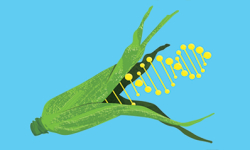Intelligence Squared U.S. Debates GMOs At NYC's Kaufman Center, December 3rd

Genetically modified organisms (GMOs) are developed for a number of different reasons - to fight disease, enhance flavor, resist pests, improve nutrition, survive drought - but around the world, communities are fighting the cultivation of genetically engineered crops, concerned about their impact on the environment and human safety. In last week's elections, measures to mandate the labeling of genetically modified food products were on the ballots in two states (Colorado and Oregon), but failed to pass in both cases. On December 3, award-winning debate series Intelligence Squared U.S. (IQ2US) will take on these issues with a debate on the motion "Genetically Modify Food."
At the debate, four authorities with a variety of backgrounds – including an appearance from an executive from Monsanto arguing for the motion and an advisor to the USDA arguing against - will debate the risks and rewards of genetically modified food in terms of our safety, their impact on the environment, and whether they can help improve food security around the globe.
Arguing for the motion:
* Robert Fraley, Executive VP & Chief Technology Officer, Monsanto
Dr. Robert Fraley is executive vice president and chief technology officer at Monsanto. He has been with Monsanto for over 30 years, and currently oversees the company’s global technology division which includes plant breeding, biotechnology, and crop protection research facilities in dozens of countries. In 2013, he was honored as a World Food Prize Laureate. He is the recipient of numerous awards, including the 2008 National Academy of Sciences Award for the Industrial Application of Science for his work on crop improvement and the National Medal of Technology from President Clinton in 1999.
* Alison Van Eenennaam, Genomics and Biotechnology Researcher, UC Davis
Alison Van Eenennaam is a genomics and biotechnology researcher and cooperative extension specialist in the Department of Animal Science at University of California, Davis. The mission of her extension program is “to provide research and education on the use of animal genomics and biotechnology in livestock production systems.” She has served on several national committees including the USDA National Advisory Committee on Biotechnology and 21st Century Agriculture. Van Eenennaam was the recipient of the 2014 Borlaug CAST Communication Award.
Arguing against the motion:
* Charles Benbrook, Research Professor, Center for Sustaining Agriculture and Natural Resources
Charles Benbrook is a research professor at the Center for Sustaining Agriculture and Natural Resources, Washington State University, and program leader of Measure to Manage: Farm and Food Diagnostics for Sustainability and Health. His career has focused on developing science-based systems for evaluating the public health, environmental, and economic impacts of changes in agricultural systems, technology, and policy. Benbrook has served as an appointed member on the USDA’s AC 21 agricultural biotechnology advisory committee since 2011. His 2012 peer-reviewed study documenting the big increase in herbicide use triggered by the planting of genetically engineered crops in the U.S. has been downloaded over 110,000 times.
* Margaret Mellon, Science Policy Consultant & Fmr. Senior Scientist, Union of Concerned Scientists
Margaret Mellon is a science policy consultant in the areas of antibiotics, genetic engineering and sustainable agriculture. In 1993, Mellon founded the Food and Environment Program at the Union of Concerned Scientists to promote the adoption of science-based farming systems that are simultaneously productive, environmentally benign, and resilient in the face of stress. The program critically evaluated products of genetic engineering for their contribution to sustainable agriculture and urged the reduction of unnecessary antibiotic use in animal agriculture. Mellon has published widely on the potential environmental impacts of biotechnology applications, and served three terms on the U.S. Department of Agriculture’s Advisory Committee on Biotechnology and 21st Century Agriculture.
The debate will also stream live online, then air soon after as part of the syndicated NPR show "Intelligence Squared U.S." On December 3, online viewers can tune in here (http://bit.ly/1tEDtYb) or via IQ2's new app (http://shorefi.re/VTwKwx)
WHAT: Intelligence Squared U.S. Debates "Genetically Modify Food"
WHEN: Wednesday, December 3, 2014 / Reception 5:45-6:30 / Debate 6:45-8:30 PM
WHERE: Kaufman Center/129 W. 67th Street (bet. Broadway and Amsterdam)/New York, NY 10023
TICKETS: $40 ($12 for students w/ ID). To purchase, visit http://www.intelligencesquaredus.org/
ABOUT INTELLIGENCE SQUARED U.S. DEBATES (IQ2US)
A non-partisan, nonprofit organization, Intelligence Squared U.S. was founded in 2006 to restore civility, reasoned analysis and constructive public discourse to today’s often biased media landscape. IQ2US reaches millions through multi-platform distribution, including radio, television, live streaming, podcasts and interactive digital content. It is one of the top 25 most popular podcasts on iTunes, and has won the 2014 Clarion Award for Radio Regular Feature Program and back-to-back 2013-2014 New York Festivals International Radio Awards for Best Public Affairs Program. The debates have attracted some of the world's top thinkers, including Malcolm Gladwell, Steven Forbes, Dr. Neal Barnard, Arianna Huffington, Paul Krugman, and Karl Rove. With close to 100 debates, Intelligence Squared U.S. has encouraged the public to "think twice" on a wide range of provocative topics. Author and ABC News correspondent John Donvan has moderated IQ2US since 2008. The executive producer is Dana Wolfe.
For more information on Intelligence Squared U.S., please contact Ray Padgett (rpadgett@shorefire.com) or Mark Satlof (msatlof@shorefire.com) at Shore Fire Media.
